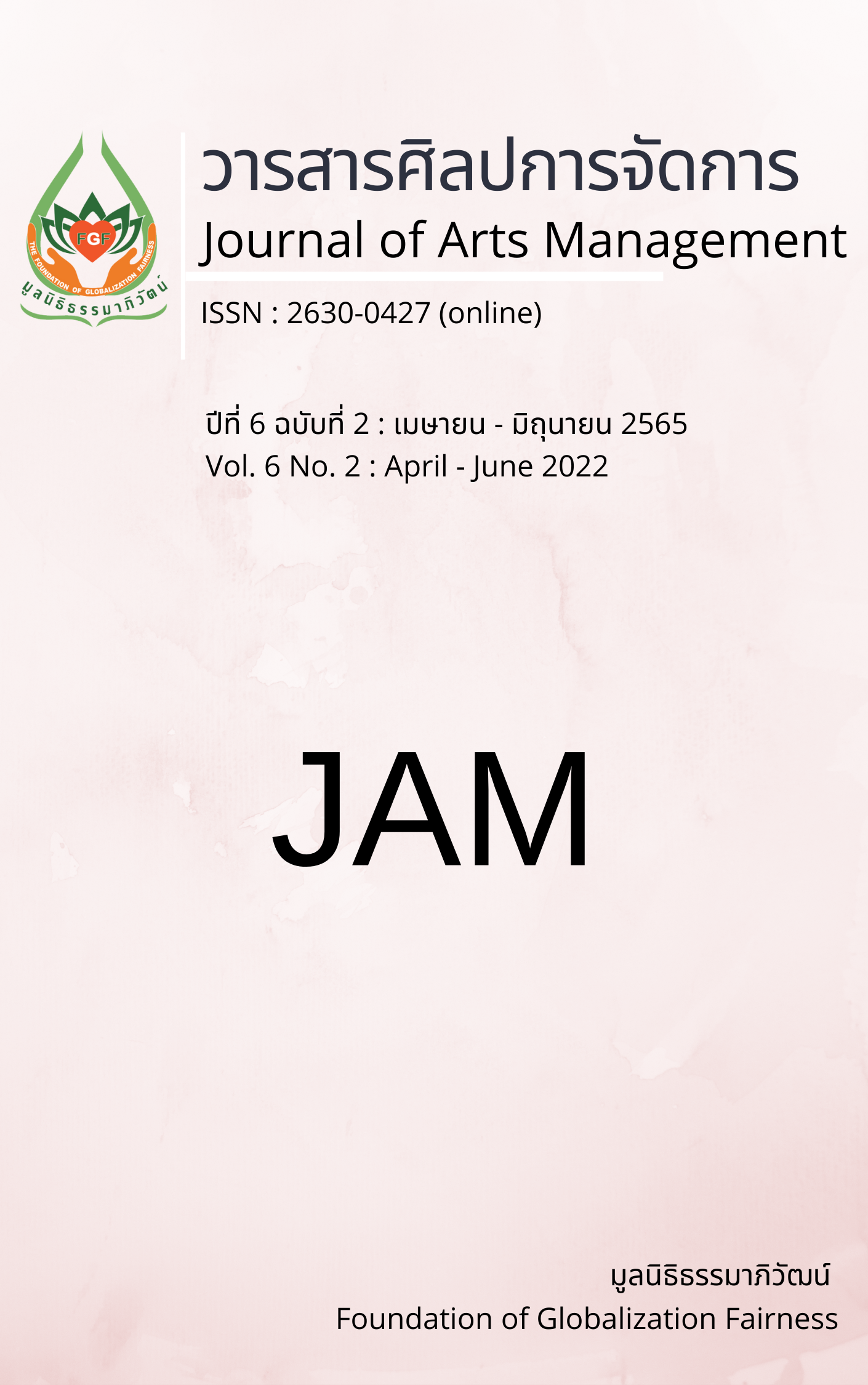A Study of Ethical Leadership in Private Organization
Main Article Content
Abstract
The objectives of this study were to (1) investigate the meaning and components of ethical leadership in private organizations; and (2) develop a tool to measure and analyze the components of ethical leadership in private organizations. A mixed-methods approach was used in this study. The qualitative data were collected through in-depth interviews with a total of 20 executives from private organizations. The quantitative data were gathered from 400 executives/supervisors in private organizations using the ethical leadership questionnaire. The qualitative data were analyzed using descriptive statistics and thematic analysis, while the quantitative data were analyzed using confirmatory factor analysis.
According to the findings, ethical leadership refers to the ability of individuals to lead an organization by exhibiting behavior that demonstrates ethics in themselves and can incentivize employees to consider the public's interests. Fairness, power sharing, ethical guidance, people orientation, integrity, role clarification, and concern for sustainability are the seven components of ethical leadership. Confirmatory factor analysis (CFA) results of the ethical leadership model were found to be consistent with the empirical data (2=528.32; df=393; p=0.081;
2/df =1.34; RMSEA=0.043; SRMR=0.044; CFI=0.99; TLI=0.98). Factor loading for the seven components of ethical leadership ranged from 0.83-0.97, with a statistical significance of 0.01 level. The ethical leadership components and tools in private organizations should be used to promote ethical leadership, which will help create ethical behavior in the organization.
Article Details

This work is licensed under a Creative Commons Attribution-NonCommercial-NoDerivatives 4.0 International License.
Views and opinions appearing in articles in the Journal of Arts of Management It is the responsibility of the author of the article. and does not constitute the view and responsibility of the editorial team I agree that the article is copyright of the Arts and Management Journal.
References
Brown M. E., Trevino L. K., & Harrison D. A. (2005). Ethical leadership: A social learning perspective for construct development and testing. Organizational Behavior and Human Decision Processes, 97(2), 117-134.
Center for Morality Promotion. (2019). Guidelines for promoting moral organization. Project of promoting private healthy organizations to drive towards moral organizations.
Eisenbeiß, S. A., & Brodbeck, F. (2014). Ethical and unethical leadership: A cross-cultural and cross-sectoral analysis. Journal of Business Ethics, 122(2), 343-359.
Hair, J. F., Black, W. C., Babin, B. J., & Anderson, R. E. (2019). Multivariate data analysis (8th ed.). Cengage Learning EMEA.
Hegarty, N., & Moccia, S. (2018). Components of ethical leadership and their importance in sustaining organizations over the long term. The Journal of Values-Based Leadership, 11(1), Article 7.
Kalshoven, K., Den Hartog, D.N., & De Hoogh, A. H. B. (2011). Ethical leadership at work questionnaire (ELW): Development and validation of a multidimensional measure. The Leadership Quarterly, 22(1), 51-69.
Leecharoen, B., & Sanohkham, B. (2016). Ethical leadership according to Buddhist principles of successful school administrators. Journal of Rattana Bundit University, 10(2), 14-24.
Myers, N.D., Ahn, S., & Jin, Y. (2011). Sample size and power estimates for a confirmatory factor analytic model in exercise and sport. Research Quarterly for Exercise and Sport, 82(3), 412-423.
Office of the National Anti-Corruption Commission. (2016). National strategy on prevention and suppression of corruption, phase 3 (2017-2021). https://www.nacc.go.th/categorydetail/201808311846996/2019111722214075?
Office of Thailand Quality Award. (2019). TQA criteria for performance excellence framework 2020-2021. Eastern Printing.
Odeneye, A. S., Hoon, S., & Phlypo, K. S. (2018). Perceptions of followers about ethical leadership and attendant effects on organizational success. Journal of Social Change, 10(1), 61-70.
Pengman, H. (2016). Business ethics for sustainable retail business. Veridian E-Journal, Silpakorn University, 9(1), 815-828.
Resick, C. J., Hanges, P. J., Dickson, M. W., & Mitchelson, J. K. (2006). A cross-cultural examination of the endorsement of ethical leadership. Journal of Business Ethics, 63, 345−359.
Regulations of the Prime Minister's Office on the Promotion of National Moral B.E. 2007. (2007, July 25). Thai government gazette, 124, Special chapter 88D, pp. 1-4.
Sabir, S. (2020). A study on ethical leadership perceptions and its impact on teachers’ commitment in Pakistan. International Journal of Educational Leadership and Management, 9(1), 28-53.
Schaubroeck, J. M., Hannah, S. T., Avolio, B. J., Kozlowski, S. W. J., Lord, R. G., Treviño, L. K., Dimotakis, N., & Peng, A. C. (2012). Embedding ethical leadership within and across organization levels. Academy of Management Journal, 55(5), 1053-1078.
Schyns, B., & Schilling, J. (2013). How bad are the effects of bad leaders? A meta-analysis of destructive leadership and its outcomes. The Leadership Quarterly, 24(1), 138–158.
Senakham, T. (2017). Leadership characteristics and success of non-profit organization in Thailand. Southeast Bangkok Journal, 3(1), 79-97.
Somprah, K., Ariratta, W., & Tang, K. N. (2013). Indicators of ethical leadership for school principals in Thailand. Procedia - Social and Behavioral Sciences, 93(4), 2085–2089.
Sutisnaa, A.J., Ruswandib, W., & Noorc, J. (2020). Does ethical leadership and employees’ personality effect employees’ performance: Regional government in Indonesia. International Journal of Innovation, Creativity and Change, 14(9), 320-333.
Tabachnick, B. G., & Fidell, L.S. (2019). Using Multivariate Statistics (7th ed.). Pearson Education.
Takong S., & Jariyawat, P. (2018). Indicators of moral leadership for administrators in basic education schools: A structural relationship. NaKhon Phanom University Journal, 8(1), 49-58.
Transparency International. (2021). Corruption Perceptions Index 2021. https://www.transparency.org/en/cpi/2021
Tushar, H. (2017). The Role of Ethical leadership in developing sustainable organization. Australasian Journal of Law, Ethics and Governance, 13(2), 83-95.
Waheed, Z., Hussin, S., Muhammad Ilyas, K., Ghavifekr, S., & Bahadur, W. (2019). Ethical leadership and change: A qualitative comparative case study in selected Malaysian transformed schools. Educational Management Administration & Leadership, 47(4), 624-639.
Waranusast, S., Sarawit T., & Waranusast, N. (2020). The synthesis of the ethical leadership components of administrators of schools under the Department of Local Administration. The Golden Teak: Humanity and Social Science Journal, 26(2), 73-80.


